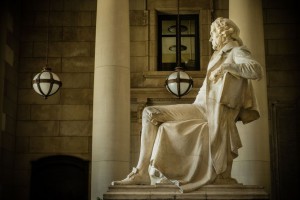The American Brexit
 A statue of Thomas Jefferson in St. Louis, MO
A statue of Thomas Jefferson in St. Louis, MO Historical knowledge is crucial in our endeavor to form a correct opinion and take the most informed, pertinent stance in current affairs. Comprehensive historical knowledge is not the sweeping and oversimplified version of history that most of us have learned, which unfortunately gives us just enough knowledge to be dangerous. Rather, a thorough understanding of history must include instances beyond glorious battlefield victories. While perhaps “boring,” these happenings have profound effects on the course of human events.
This historical minutia provides perspective on recent major occurrences and can be used in our decision-making processes as we attempt to learn from our mistakes or become bound to repeat them.
For example, we love to quote our founding fathers and evoke their names every time we feel we are being wronged or that our freedoms are being curtailed. However, we don’t so much enjoy delving into the very complicated situations faced by our first national leaders during our national infancy. Neither are we always inclined to examine how they interpreted the (then very new) document we so love to argue over two hundred some years later—an interpretation that led to our own American version of the Brexit.
During Thomas Jefferson’s second presidential term, starting in 1804, the fledgling United States became caught between the two global superpowers of the time: France and Britain. We were by no stretch of the imagination a superpower ourselves at that time, even though many Americans probably envision us as having ruled the world starting from the moment the British surrendered at Yorktown. Yes, we had beaten the British, but we were by that time in no way their equals in military might. The American Revolution was to the British a small part of a much larger world war in which they were embroiled.
President Jefferson would have been held close to the hearts of most conservative Americans today. He was an ardent advocate of states’ rights and a small federal government. He, like many of us today, was worried about the threat of tyranny and oppression ruining our new utopia. The majority in Congress shared these views. However, unlike many of us today, they resorted to severely limiting the size and power of the national military as their primary solution.
The problem was that from the start we were a nation of world trade, and at that time the world was engulfed in the Napoleonic Wars. We wanted to remain neutral to be able to trade with both sides. Both sides wanted to keep us from trading with their enemy. Britain was the sea power, so it began to blockade our ports and inspect cargos bound for Europe. The British also began pressing into service any sailor they believed to have been a deserter from their navy, along with many unfortunate American citizens.
That any nation on earth would have the gumption to do this is almost incomprehensible to us today. We lost our minds over Iran detaining one of our patrol boats after it wandered into their waters, after all.
But at the time, Britain was the big kid on the block, and there wasn’t much we could do about it, even though we were incensed.
This is where history gets instructive. Jefferson, the champion of small government and guardian against central government tyranny, wanted to increase the size of the military to deal with the threat. At the time, we only had 2,800 soldiers in our national army, but Congress definitively rejected the suggestion. This left Jefferson with only two options: to do nothing or to use economic coercion. He decided on the latter, signing into law the Embargo Act of 1807. He decided to cut off all trade with Britain, but the very notion of enforcing this embargo required an intrusion into American freedoms that many perceived to be tyrannical. Merchant sailors were forced to let their boats rot in port and farmers to let their crops rot in the fields because of a central government decree. In the end, the embargo was so hard to enforce that Jefferson, the writer of our Declaration of Independence and the champion of inalienable individual rights, resorted to boarding and searching ships with neither a warrant nor probable cause and to seizing them without the due process of law.
On top of that, the embargo was an epic failure, both economically and diplomatically. Our new isolationism sent us into a deep economic depression, while Britain actually gained from it. The British took over our trading routes in South America while our ships sat in port. They simply bought the goods they needed from elsewhere, while at the same time, they opened up new markets for their own goods. Much like the Brexit ordeal, Jefferson’s embargo tore our nation in two, inciting massive protests throughout our country.
The act was repealed two years later as an utter failure. It was an international embarrassment that severely undermined our bargaining position with Britain and tarnished Jefferson’s legacy. That is until we forgot about it as a minor caveat to his overall glowing reputation in the American mythos.
Ironically, Jefferson ended up striking a trade deal with Napoleon. Jefferson, who had ardently supported the French Revolution and all its bloodshed at the expense of relations with England, ended up signing a treaty with the dictator that had ended French democracy so soon after it had begun, much like what he feared would happen in America.
Lessons to be learned here are, firstly, that neither we nor any other great nation on this earth can isolate ourselves from the rest of the world to any significant extent without devastating consequences. Secondly, even the same founding fathers that gave us our ideals were forced to quickly betray some of those ideals when attempting to deal with the realities of the world we live in.
